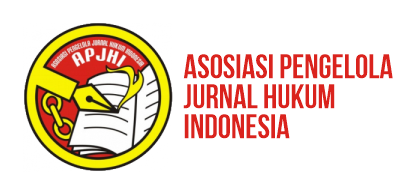Divorce Pandemic Rate During the Covid-19
Abstract
Keywords
Full Text:
PDFReferences
References
Ali, H. Z. (2010). Hukum Perdata Islam di Indonesia. Jakarta : Sinar Grafika.
Amelia, A. (2020). Pelaksanaan Asas Mempersulit Terjadinya Perceraian Pada Pengadilan Agama Payakumbuh Berdasarkan Undang-Undang No 1 Tahun 1974 Tentang Perkawinan. JOM Fakultas Hukum, 7(2).
Asmuni. (2016). Perceraian Dalam Perspektif Fikih Klasik Dan Kompilasi Hukum Islam. Jurnal Warta.
Azizah, L. (2012). Analisis Perceraian Dalam Kompilasi Hukum Islam. Jurnal Al-'Adalah, 10(4).
Bakung, Alhasni, D., Muhtar, & Hidayat, M. (2020). Determination of The Legal Protection of RightHolders to Neighboring Rights. Jambura Law Review, 2(1).
Ghozali, A. R. (2015). Fiqh Munakahat. Prenada Media Group.
Hoerudin, A. (2010). Pengadilan Agama (Bahasan Tentang Pengertian, Pengajuan Perkara, dan Kewenangan Pengadilan Agama Setelah Berlakunya Undang-Undang Nomor 7 Tahun 1989 Tentang Peradilan Agama). Bandung : PT. Aditya Bakti.
Indonesia, R. (1974). Undang-Undang Republik Indonesia No. 1 Tahun 1974 Tentang Perkawinan. 2003(1), 2. https://peraturan.bpk.go.id/Home/Details/47406/uu-no-1-tahun-1974
Ishaq. (2017). Metode Penulisan Hukum dan Penulisan Skripsi Tesis serta Disertasi. Bandung : Alfabeta.
Kasim, N. M. (2015). Ancaman Keutuhan Perkawinan Dalam Kehidupan Rumah Tangga. Jurnal Hukum Legalitas, 8(1), 2.
Kementrian Sekretariat Negara RI. (2019). Undang-Undang No.16 Tahun 2019 Tentang Perubahan Undang-undang no 1 Tahun 1974 Tentang Perkawinan. 006265, 2-6. https://peraturan.bpk.go.id/Home/Details/122740/uu-no-16-tahun-2019
M. Wantu, F. (2012). Mewujudkan Kepastian Hukum, Keadilan dan Kemanfaatan Dalam Putusan Hakim di Peradilan Perdata. Jurnal Dinamika Hukum, 12(J. Din. Huk.), 216.
M. Wantu, F. (2013). Kendala Hakim Dalam Menciptakan Kepastian Hukum, Keadilan, dan Kemanfaatan di Peradilan Perdata. Mimbar Hukum, 25(2).
M. Wantu, F., & Rasyid, U. (2020). Redefinisi Kewenangan Komisi Yudisial Dalam Konstitusi: Upaya Mengharmonisasikan Putusan Pelaku Kekuasaan Kehakiman Indonesia. Jurnal Majelis.
Nur Dewata, M. F., & Achmad, Y. (2013). Dualisme Penelitian Hukum Normatif & Empiris. Pustaka Pelayar. https://www.ptonline.com/articles/how-to-get-better-mfi-results
Nurhayati, A. (2011). Pernikahan dalam Perspektif Al-Quran. Asas, 3(1), 332-333.
Ratnawati, E., Kamba, S. N. M., Sihombing, J. S., & Maloringan, J. F. (2021). Catat Perkawinan Untuk Kepastian Dan Perlindungan Hukum (Studi Kasus: Kabupaten Minahasa Utara). Jurnal Legislasi Indonesia, 18(2). https://doi.org/10.54629/jli.v18i2.817
Sofyan, S. S. M. (2010). Hukum Perdata : Hukum Benda. Liberty Yogyakarta.
Subekti. (2017). Pokok-Pokok Hukum Perdata. Jakarta : PT Intermasa.
Sulfahmi. (2017). Pengaruh Perkawinan Di Bawah Umur Terhadap Tingkat Perceraian Dalam Perspektif Hukum Islam (Studi Kasus) Di Kecamatan Kindang Kabupaten Bulukumba. 1-14.
Syamsuddin, A. A. (2017). Fathul al-Qorib al-Mujib fi Syarhi Alfadi at-Taqrib. Maktabah As-Salam.
Syarifuddin, A. (2006). Hukum Perkawinan Islam Di Indonesia.
T. Mandjo, J., & Y. Imran, S. (2020). Implementasi Undang-Undang Dasar Negara Republik Indonesia Tahun 1945 Pasal 27 Ayat 2 Tentang Hak Untuk Mendapatkan Pekerjaan Dan Penghidupan Yang Layak Bagi Kemanusiaan. Jurnal Majelis, 85.
Una, S. (2014). Pedoman Penulisan Skripsi. Syariah Press, 34-35.
Waluyo, B. (2010). Penulisan Hukum Dalam Praktek. Jakarta : Sinar Grafika.
Wijaya, A., & Nasran, N. (2021). Comparison Of Judicial Review: A Critical Approach To The Model In Several Countries. Jurnal Legalitas, 14(2), 85-106. https://doi.org/10.33756/jelta.v14i2.11809
Wijayanto, K., Tijow, L. M., & Wantu, F. M. (2020). Kedudukan Peraturan Desa Dalam Sistem Pembentukan Peraturan Perundang Undangan Nasional. Jurnal Ius Civile, 4(2).
DOI: https://doi.org/10.33756/eslaj.v4i2.18270
Refbacks
- There are currently no refbacks.
Copyright (c) 2022 patamani isra
License URL: http://creativecommons.org/licenses/by-sa/4.0/
| | | |
| | | | |
| | | | |
| | |
Estudiante Law Journal has been available at:
| | | | |
| | | | |
| | | | |
| | | | |




-2.png)
.png)





